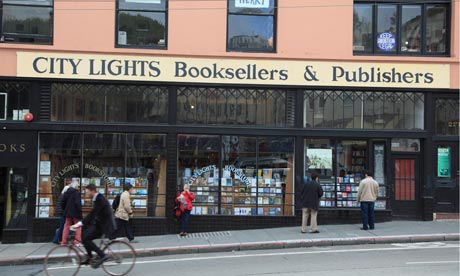
I remember the first time I went to City Lights – the first all-paperback bookstore in the US, founded in San Francisco in 1953 by Lawrence Ferlinghetti. I was so intimidated I barely looked at the books on the shelves, maybe picking one up every now and then and pretending to read it, just so I had a reason to stand there. This place had a powerful influence not only on American poetry – with the publication of Allen Ginsberg's Howl in 1955 – but also on the American consciousness, being the nation's most daring publisher of independent literature and an epicentre for progressive thought.
The immense popularity of Ginsberg's book and its obscenity trial also propelled the Beat generation into the international spotlight, with writers such as Jack Kerouac and William S Burroughs directly influencing a generation of non-comformist youth. For the first and – arguably – only time, literature became a popular movement in the US: busloads of tourists from all over the world travelled to the North Beach book store in search of the famous "beatniks".
As a college student, the mythology of the Beats and their writing so inspired me and my best friend that we hit the road in 2003 and drove from Savannah, Georgia, to San Francisco, going hours out of our way at every opportunity just to give people rides and to embrace our adventure. We actually started calling each other Jack and Neal, which feels pretty embarrassing now, but we were living the dream and, though it wasn't ours, we were determined that it could be.
It was six years later that I moved to San Francisco, and I don't even remember the first event that got me hooked on City Lights. The poetry room, where it hosts most of its events (still as many as four a week), is relatively small, holding maybe 30 people, and I've been back so many times I've seen some authors release more than one book there. I'm still learning about the goings-on at City Lights, despite having contributed countless videos and an occasional audio file to its blog because, like any force of nature, it just keeps upping the ante: in almost four years of living in the city, I've seen week-long festivals and new imprints launched and it shows no signs of slowing down.
All in all, City Lights puts out more than a dozen books per year and has now published more than 200 titles. I don't know how it does it – the staff hasn't got any bigger – but I do know the reverence I feel when I walk into the store is not diminishing. A subversive attitude pervades it: people are welcome to sit in the basement or in the poetry room and read entire books if they want (and many argue there is no better spot to do so).
While most of the Beats are gone and tourists don't expect to find them, North Beach remains a destination for visitors and locals alike, as the neighbourhood has maintained the charm and vitality of an older time – no small feat in a city where the cafes are now largely full of tech developers and silent artists staring intently into their MacBook Pros. But even as tech companies buy out the poor neighbourhoods and the city's government buckles beneath their capital – cutting funding for the arts while giving tax breaks to dotcom start-ups – City Lights continues to flourish, providing an ever-fertile environment for writers, thinkers and the promise that they can change the world.
• City Lights Booksellers & Publishers is celebrating its 60th anniversary on 23 June 2013, with events throughout the year (citylights.com; blogcitylights.com).
Evan Karp is a poet, columnist and founder of the literary non-profit Quiet Lightning, and founding editor of Litseen.com
• For more information on holidays in the USA, visit DiscoverAmerica.com

